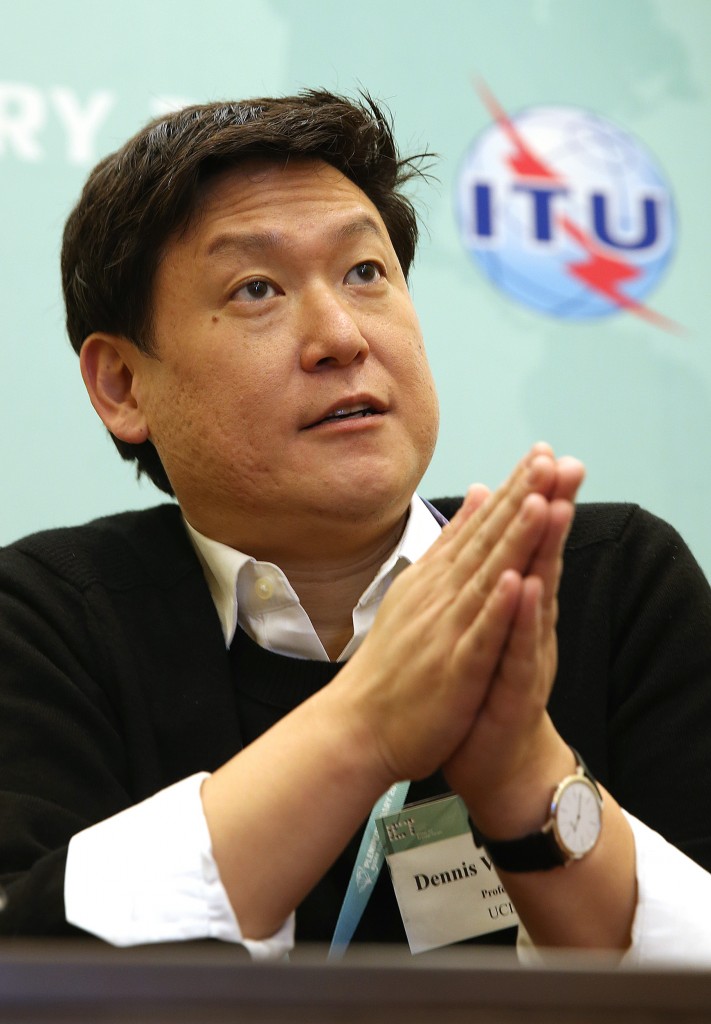- California Assembly OKs highest minimum wage in nation
- S. Korea unveils first graphic cigarette warnings
- US joins with South Korea, Japan in bid to deter North Korea
- LPGA golfer Chun In-gee finally back in action
- S. Korea won’t be top seed in final World Cup qualification round
- US men’s soccer misses 2nd straight Olympics
- US back on track in qualifying with 4-0 win over Guatemala
- High-intensity workout injuries spawn cottage industry
- CDC expands range of Zika mosquitoes into parts of Northeast
- Who knew? ‘The Walking Dead’ is helping families connect
UCLA professor assures strength in S. Korean tech despite falling profits

Dennis Hong, a U.S. robotics professor considered one of the most promising researchers in the field, said Oct. 28, 2014 South Korean tech firms still have a bright future despite their recent lackluster earnings as the country gains a stronger voice in the industry. (Yonhap)
BUSAN (Yonhap) — Dennis Hong, a U.S. robotics professor considered one of the most promising researchers in the field, said Tuesday South Korean tech firms still have a bright future despite their recent lackluster earnings as the country gains a stronger voice in the industry.
“Samsung’s profit drops and many people believe that sales of these new smartphones fell from the competition,” Hong told Yonhap News Agency in an interview. “However, ICT [Information and Communication Technology] doesn’t just stop there. Smartphones are just one small part of the big picture.”
Hong, currently a professor at the University of California-Los Angeles, was picked as one of top 10 brightest young researchers in the United States by Popular Science in 2009. He earned fame after developing the world’s first automobile for the visually impaired in 2011.
The local tech industry is feared to be on a decline after Samsung Electronics Co., the world’s No. 1 smartphone maker, and other leaders were reporting falling profits as Chinese competitors were infiltrating the market with cheaper products. Samsung earlier this month estimated its 2014 third-quarter operating profit to have plunged nearly 60 percent.
“Besides all those profit [issues], I only see positive things, and I see rosy pictures for South Korean ICT firms as well,” Hong said. Hosting the International Telecommunications Union (ITU) conference, underway here, shows that the world sees South Korea as the leader of ICT.
The professor noted that ITU is where global standards are set.
“Standards are the key. Products are products. A good example would be [South Korea-developed] WiBro. It has been a very good technology,” he said. “However, the world’s adaptation was very low.”
WiBro, short for wireless broadband, is an improved version of the Internet technology.
“The key players used to be from the American or the European side, but I think it is shifting towards China and Korea. I think this is a good opportunity,” he said.
The challenge for South Korea, according to Hong, is bringing creativity to the local education system, which relies more on knowledge than thinking.
“In the United States, we do group open-ended projects. We do research without knowing whether this is possible or not. This is the kind of area that [Korean students] struggle in,” Hong said. “In the United States in general, they talk to each other. In Korea, they want individually to excel, so they push others to go up.”
Hong said although he had observed many high-tech robots in South Korea, he could not find a unique model that has not been made in other countries.”
In a press meeting prior to the interview, Hong said researchers in South Korea are forced to conduct projects that can create revenue in a short-term basis. “It is different in the U.S. There, people focus on fundamental science. If the fundamentals are not strong enough, there will be problems in the long term.”
Hong was born in the U.S. in 1971 but was educated in South Korea through high school.
Hong was in Busan to attend the Global ICT Premier Forum, being held alongside the quadrennial ITU conference.















